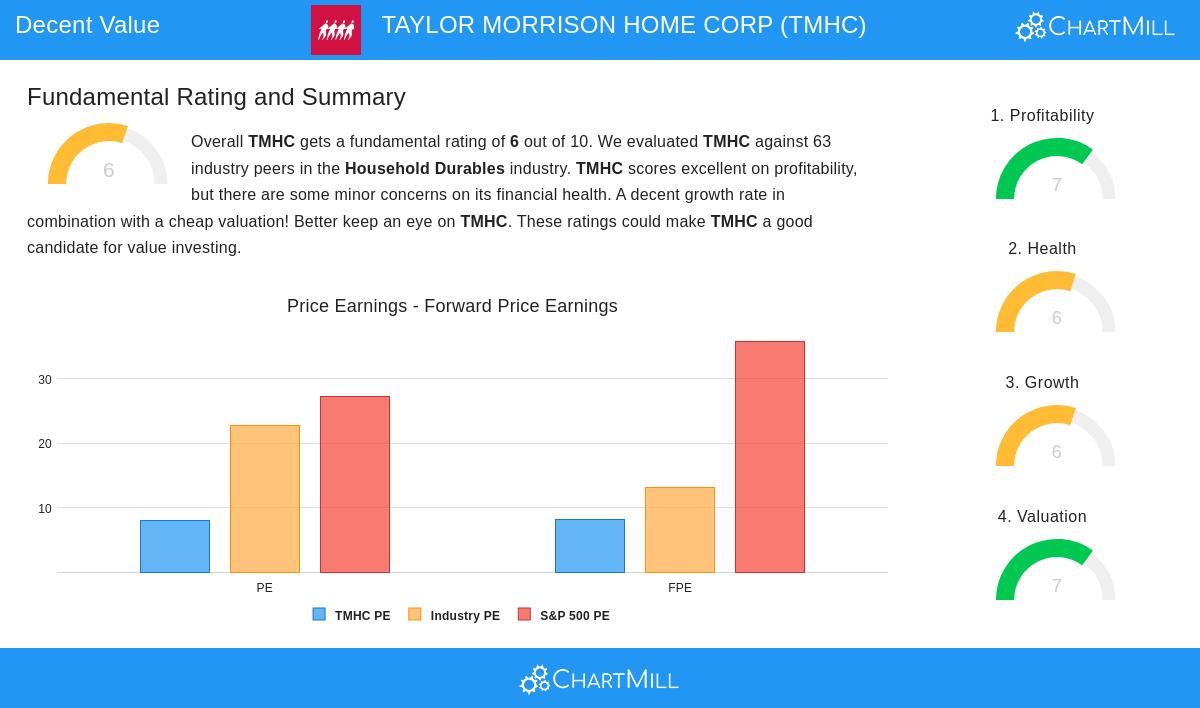Homebuilders have faced significant headwinds in recent years amid rising interest rates and shifting housing demand, creating pockets of potential opportunity for investors employing a value-oriented approach. The search for undervalued companies, those trading below their intrinsic worth while maintaining solid underlying fundamentals, often leads to sectors experiencing temporary pressures. One such candidate emerging from a systematic screen for decent value stocks is TAYLOR MORRISON HOME CORP (NYSE:TMHC), a national homebuilder with a diverse portfolio of residential properties and community developments.

Value investing relies on identifying discrepancies between market price and intrinsic value, emphasizing financial health, profitability, reasonable valuation, and sustainable growth. These elements help investors avoid value traps, companies that appear cheap but possess deteriorating fundamentals, while capturing potential upside as market sentiment improves. Taylor Morrison’s fundamental profile, particularly its valuation metrics and operational strengths, suggests it may fit this strategy.
Valuation Taylor Morrison’s most notable attribute is its valuation. The company’s price-to-earnings ratio of 8.02 is not only below the industry average but also significantly lower than the S&P 500’s P/E of 27.24, placing it in the cheapest quartile among household durable peers. Its forward P/E of 8.10 further supports this undervaluation. These ratios indicate that the market may be pricing in excessive pessimism about the housing sector, despite the company’s ability to generate earnings. For value investors, such low multiples provide a margin of safety, a buffer against estimation errors or prolonged market downturns.
Profitability Strong profitability is essential for value stocks, as it supports the company’s ability to sustain operations, reinvest, and potentially return capital to shareholders. Taylor Morrison performs well here, with a profit margin of 10.72% that outperforms 85.71% of industry competitors. Its operating margin of 15.01% is equally strong, reflecting efficient cost management and pricing power. High returns on assets (9.53%) and invested capital (11.58%) further demonstrate effective deployment of resources. These metrics are critical in value investing because they indicate operational resilience and the potential for durable cash flows, reducing the risk of permanent capital impairment.
Financial Health A solid balance sheet is another pillar of value investing, ensuring that a company can weather economic uncertainty without resorting to dilutive financing or drastic cuts. Taylor Morrison’s Altman-Z score of 3.91 signals low bankruptcy risk, and its debt-to-equity ratio of 0.35 reflects moderate leverage compared to peers. However, the company’s quick ratio of 0.32 raises some liquidity concerns, as it suggests a reliance on inventory conversion to meet short-term obligations. While this is common in homebuilding, it warrants monitoring. Overall, the company’s financial health is adequate, providing a reasonable foundation for long-term stability.
Growth Value investments often benefit from underlying growth that can catalyze a revaluation. Taylor Morrison has delivered strong historical growth, with earnings per share increasing by 26.06% over the past year and revenue growing at 13.77%. Average annual EPS growth of 23.42% over recent years highlights operational execution. However, future growth is expected to moderate, with EPS projected to increase by 8.96% annually and revenue by just 2.62%. This deceleration is typical in cyclical industries but may limit near-term multiple expansion. Nevertheless, for value investors, the combination of low valuation and respectable growth prospects remains appealing.
Taylor Morrison represents a potential opportunity for investors seeking undervalued stocks with sound fundamentals. Its low valuation, high profitability, and adequate financial health align well with the principles of value investing, though investors should remain mindful of sector-specific risks, including interest rate sensitivity and housing market volatility. For those interested in exploring similar opportunities, additional screened results can be found using this Decent Value Stocks filter.
Disclaimer: This analysis is based on publicly available information and is provided for informational purposes only. It does not constitute investment advice, and readers should conduct their own research or consult a financial advisor before making investment decisions.



